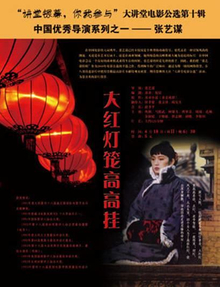| Raise the Red Lantern | |
|---|---|
 Chinese theatrical release poster | |
| Traditional Chinese | 大紅燈籠高高掛 |
| Simplified Chinese | 大红灯笼高高挂 |
| Literal meaning | Big red lanterns are hung high |
| Hanyu Pinyin | Dà Hóng Dēnglong Gāogāo Guà |
| Directed by | Zhang Yimou |
| Written by | Ni Zhen |
| Based on | Raise the Red Lantern (Wives and Concubines) by Su Tong |
| Produced by | Hou Hsiao-hsien Chiu Fu-sheng Zhang Wenze |
| Starring | |
| Cinematography | Zhao Fei |
| Edited by | Du Yuan |
| Music by | Zhao Jiping |
Production companies |
|
| Distributed by | Orion Classics |
Release date |
|
Running time | 125 minutes |
| Countries | China Hong Kong |
| Language | Mandarin |
| Budget | $1 million [2] |
| Box office | $2.6 million (United States)[3]
$3 million+ (Italy)、$2 million+ (France) [4] $11 million+ (HK$85million+) (Outside Asia) [5] |
Raise the Red Lantern is a 1991 Chinese period drama film directed by Zhang Yimou and starring Gong Li. It is an adaptation by Ni Zhen of the 1990 novella Raise the Red Lantern (originally Wives and Concubines) by Su Tong. The film was later adapted into an acclaimed ballet of the same title by the National Ballet of China, also directed by Zhang. Set during the Warlord Era in the 1920s, the film tells the story of a young woman who becomes the fourth wife of a wealthy man. It was the third of eight collaborations between Zhang and Gong, following Red Sorghum in 1987 and Ju Dou in 1990. The film was shot in the Qiao Family Compound near the ancient city of Pingyao, in Shanxi Province.
Raise the Red Lantern received widespread critical acclaim. It was entered into the 48th Venice International Film Festival, where it was nominated for the Golden Lion and won the Silver Lion. It was also nominated for the Academy Award for Best Foreign Language Film and won the BAFTA Award for Best Film Not in the English Language. It is considered an important work in the so-called Fifth Generation movement of Chinese cinema and is one of the most internationally highly-regarded films from mainland China overall;[6] it appeared on The New York Times's list of the 1000 best films ever made in 2004 and on the BBC's list of the 100 greatest foreign language films in 2018.
- ^ a b "Raise the Red Lantern". Hong Kong Movie Database. Archived from the original on 21 October 2021. Retrieved 21 October 2021.
- ^ Pan, BY Lynn (March 1992). "A Chinese Master". The New York Times.
- ^ "Raise the Red Lantern (1992)". Box Office Mojo. Archived from the original on 1 October 2007. Retrieved 6 August 2007.
- ^ 焦雄屏 (1998). 時代顯影 (in Chinese (Taiwan)). 遠流出版. ISBN 978-957-32-3427-2.
- ^ Service, United States Foreign Broadcast Information (1995). Daily Report: People's Republic of China. National Technical Information Service.
- ^ "100 Best Chinese Mainland Films". Time Out. Archived from the original on 21 November 2015. Retrieved 20 February 2024.